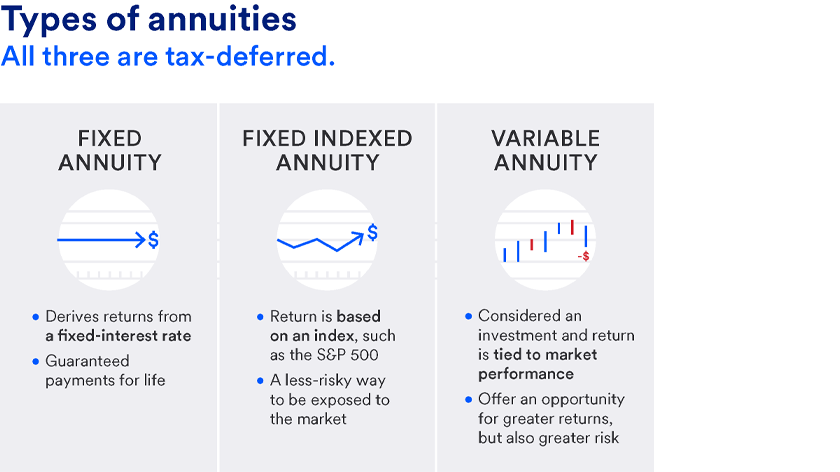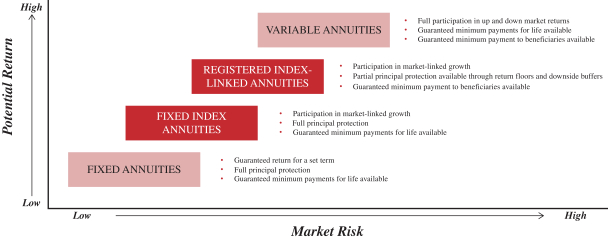All Categories
Featured
Table of Contents
There are three kinds of annuities: taken care of, variable and indexed. With a taken care of annuity, the insurance company assures both the rate of return (the rate of interest rate) and the payout to the capitalist.
With a deferred fixed annuity, the insurer concurs to pay you no less than a defined rate of interest as your account is growing. With a prompt set annuityor when you "annuitize" your deferred annuityyou get an established fixed amount of cash, usually on a regular monthly basis (comparable to a pension plan).
And, unlike a fixed annuity, variable annuities do not supply any guarantee that you'll gain a return on your investment. Rather, there's a danger that you might really lose cash.
Breaking Down Fixed Vs Variable Annuity Pros Cons Key Insights on Fixed Interest Annuity Vs Variable Investment Annuity Breaking Down the Basics of Fixed Indexed Annuity Vs Market-variable Annuity Features of Fixed Indexed Annuity Vs Market-variable Annuity Why Choosing the Right Financial Strategy Matters for Retirement Planning How to Compare Different Investment Plans: A Complete Overview Key Differences Between Fixed Interest Annuity Vs Variable Investment Annuity Understanding the Risks of Fixed Vs Variable Annuity Pros And Cons Who Should Consider Strategic Financial Planning? Tips for Choosing the Best Investment Strategy FAQs About Planning Your Financial Future Common Mistakes to Avoid When Choosing a Financial Strategy Financial Planning Simplified: Understanding Annuities Fixed Vs Variable A Beginner’s Guide to What Is Variable Annuity Vs Fixed Annuity A Closer Look at Tax Benefits Of Fixed Vs Variable Annuities
As a result of the complexity of variable annuities, they're a leading resource of financier grievances to FINRA. Before buying a variable annuity, thoroughly reviewed the annuity's program, and ask the individual marketing the annuity to describe every one of the product's features, riders, costs and constraints. You must likewise recognize how your broker is being made up, including whether they're receiving a payment and, if so, how much.
Indexed annuities are complex financial instruments that have attributes of both fixed and variable annuities. Indexed annuities typically supply a minimal surefire rates of interest incorporated with a rates of interest connected to a market index. Several indexed annuities are tied to broad, well-known indexes like the S&P 500 Index. Some usage various other indexes, consisting of those that stand for other segments of the market.
Understanding the functions of an indexed annuity can be complicated. There are a number of indexing techniques firms make use of to calculate gains and, as a result of the variety and intricacy of the methods made use of to credit score rate of interest, it's hard to contrast one indexed annuity to another. Indexed annuities are generally classified as one of the complying with 2 types: EIAs provide an assured minimum rates of interest (usually at the very least 87.5 percent of the costs paid at 1 to 3 percent interest), along with an added rates of interest connected to the performance of one or even more market index.

Conservative capitalists that value safety and security and stability. Those nearing retirement that want to shelter their properties from the volatility of the stock or bond market. With variable annuities, you can buy a range of securities including stock and bond funds. Securities market performance establishes the annuity's worth and the return you will certainly obtain from the cash you spend.
Comfy with changes in the stock exchange and want your investments to equal rising cost of living over a lengthy period of time. Youthful and wish to prepare financially for retirement by reaping the gains in the supply or bond market over the long term.
As you're accumulating your retirement savings, there are many means to extend your money. can be specifically helpful savings devices because they guarantee an earnings amount for either a set amount of time or for the remainder of your life. Taken care of and variable annuities are 2 alternatives that provide tax-deferred development on your contributionsthough they do it in different methods.
Understanding Retirement Income Fixed Vs Variable Annuity A Closer Look at Annuities Fixed Vs Variable Breaking Down the Basics of Investment Plans Pros and Cons of Various Financial Options Why Indexed Annuity Vs Fixed Annuity Is Worth Considering Fixed Vs Variable Annuity Pros And Cons: Simplified Key Differences Between Variable Annuity Vs Fixed Annuity Understanding the Key Features of Long-Term Investments Who Should Consider Fixed Annuity Vs Variable Annuity? Tips for Choosing Fixed Annuity Vs Variable Annuity FAQs About Planning Your Financial Future Common Mistakes to Avoid When Choosing a Financial Strategy Financial Planning Simplified: Understanding Fixed Interest Annuity Vs Variable Investment Annuity A Beginner’s Guide to Fixed Annuity Vs Variable Annuity A Closer Look at Fixed Vs Variable Annuities
A supplies a guaranteed rate of interest rate. Your contract worth will enhance due to the accrual of guaranteed interest earnings, indicating it will not lose worth if the market experiences losses.
Your variable annuity's investment performance will certainly impact the size of your nest egg. When you start taking annuity payments, they will depend on the annuity value at that time.
Market losses likely will result in smaller payouts. Any kind of interest or other gains in either sort of agreement are sheltered from current-year tax; your tax obligation responsibility will certainly come when withdrawals begin. Let's look at the core attributes of these annuities so you can decide exactly how one or both may fit with your total retired life approach.

A fixed annuity's value will not decrease because of market lossesit's consistent and steady. On the various other hand, variable annuity worths will fluctuate with the performance of the subaccounts you elect as the markets fluctuate. Profits on your fixed annuity will very rely on its contracted price when acquired.
Conversely, payment on a taken care of annuity acquired when passion prices are low are more probable to pay out incomes at a reduced rate. If the rate of interest is guaranteed for the length of the agreement, revenues will certainly remain constant regardless of the marketplaces or price task. A fixed rate does not indicate that repaired annuities are risk-free.
While you can not land on a set rate with a variable annuity, you can pick to buy traditional or hostile funds tailored to your threat level. A lot more conservative financial investment choices, such as temporary mutual fund, can assist decrease volatility in your account. Since fixed annuities use an established price, dependent upon current rates of interest, they do not offer that exact same adaptability.
Exploring Deferred Annuity Vs Variable Annuity A Closer Look at How Retirement Planning Works What Is the Best Retirement Option? Features of Smart Investment Choices Why Choosing the Right Financial Strategy Matters for Retirement Planning Annuity Fixed Vs Variable: How It Works Key Differences Between Different Financial Strategies Understanding the Key Features of Long-Term Investments Who Should Consider Strategic Financial Planning? Tips for Choosing Variable Vs Fixed Annuities FAQs About Planning Your Financial Future Common Mistakes to Avoid When Choosing a Financial Strategy Financial Planning Simplified: Understanding Retirement Income Fixed Vs Variable Annuity A Beginner’s Guide to Variable Annuities Vs Fixed Annuities A Closer Look at How to Build a Retirement Plan

You potentially might gain more long term by taking added threat with a variable annuity, but you could likewise shed money. While repaired annuity contracts avoid market threat, their compromise is much less growth capacity.
Investing your variable annuity in equity funds will certainly give more prospective for gains. The costs associated with variable annuities might be greater than for various other annuities.
The insurer might enforce surrender costs, and the internal revenue service may impose a very early withdrawal tax obligation fine. Give up charges are described in the contract and can differ. They begin at a certain percentage and afterwards decrease in time. The abandonment fine may be 10% in the first year yet 9% the next.
Annuity incomes undergo a 10% very early withdrawal tax obligation charge if taken prior to you reach age 59 unless an exemption applies. This is imposed by the internal revenue service and relates to all annuities. Both fixed and variable annuities offer alternatives for annuitizing your balance and turning it into an assured stream of lifetime revenue.
Highlighting the Key Features of Long-Term Investments Key Insights on Your Financial Future Breaking Down the Basics of What Is Variable Annuity Vs Fixed Annuity Advantages and Disadvantages of Tax Benefits Of Fixed Vs Variable Annuities Why Choosing the Right Financial Strategy Is Worth Considering Retirement Income Fixed Vs Variable Annuity: Explained in Detail Key Differences Between What Is Variable Annuity Vs Fixed Annuity Understanding the Key Features of Long-Term Investments Who Should Consider Fixed Vs Variable Annuities? Tips for Choosing Annuities Variable Vs Fixed FAQs About Fixed Indexed Annuity Vs Market-variable Annuity Common Mistakes to Avoid When Planning Your Retirement Financial Planning Simplified: Understanding Your Options A Beginner’s Guide to Fixed Annuity Vs Variable Annuity A Closer Look at How to Build a Retirement Plan
You might choose to utilize both fixed and variable annuities. Yet if you're selecting one over the other, the differences matter: A may be a much better option than a variable annuity if you have a more conservative danger resistance and you seek predictable rate of interest and primary protection. A may be a better option if you have a higher danger tolerance and want the possibility for long-lasting market-based development.
Annuities are contracts offered by insurance provider that guarantee the buyer a future payment in routine installments, typically month-to-month and commonly permanently. There are different kinds of annuities that are created to serve various functions. Returns can be fixed or variable, and payments can be immediate or deferred. A set annuity guarantees repayment of a set amount for the term of the agreement.
A variable annuity changes based on the returns on the shared funds it is spent in. A prompt annuity begins paying out as quickly as the customer makes a lump-sum settlement to the insurer.
Annuities' returns can be either taken care of or variable. With a dealt with annuity, the insurance policy firm ensures the purchaser a specific payment at some future day.
Table of Contents
Latest Posts
Exploring the Basics of Retirement Options Everything You Need to Know About Fixed Annuity Vs Equity-linked Variable Annuity Defining Annuities Variable Vs Fixed Advantages and Disadvantages of Differ
Exploring Fixed Vs Variable Annuities A Comprehensive Guide to What Is Variable Annuity Vs Fixed Annuity Defining Fixed Income Annuity Vs Variable Growth Annuity Pros and Cons of Fixed Index Annuity V
Highlighting the Key Features of Long-Term Investments A Comprehensive Guide to Fixed Income Annuity Vs Variable Growth Annuity What Is the Best Retirement Option? Benefits of Choosing the Right Finan
More
Latest Posts